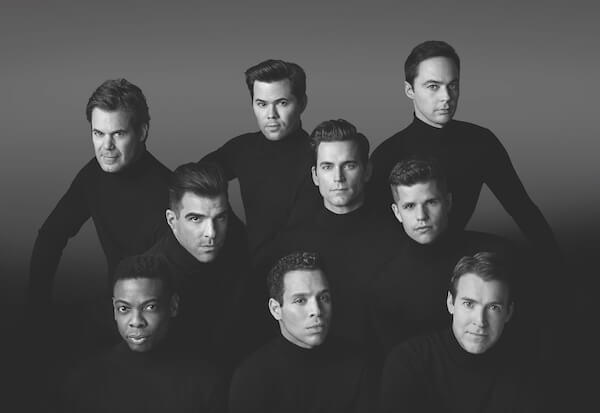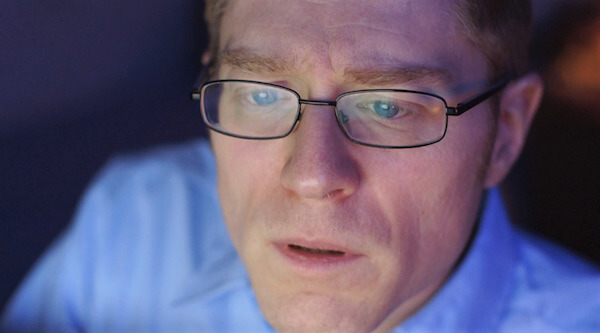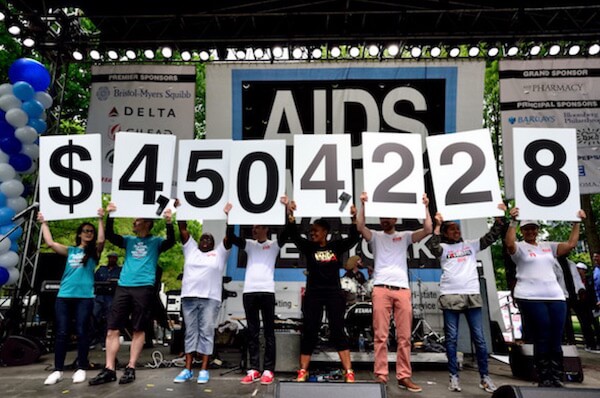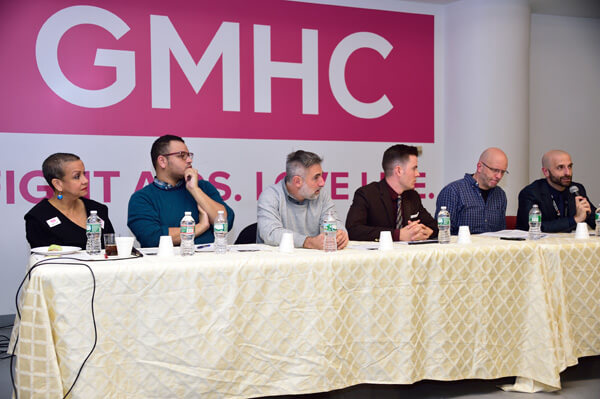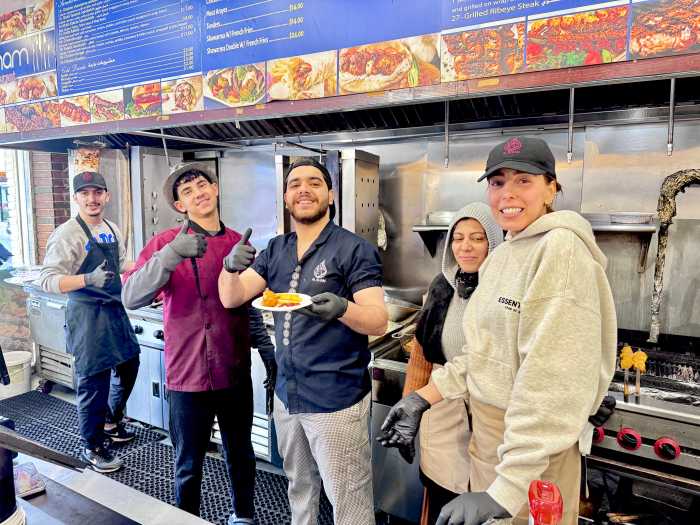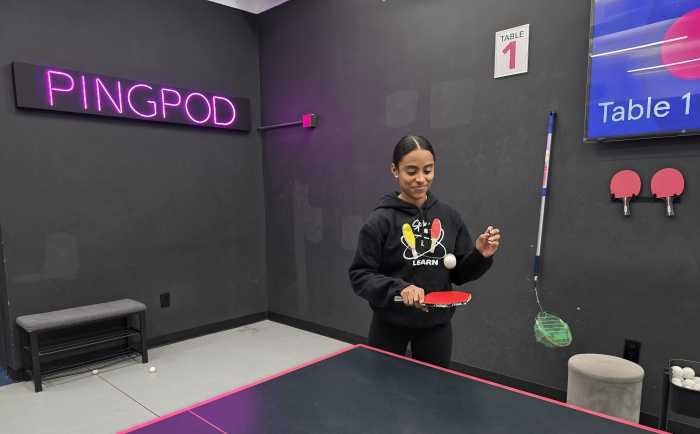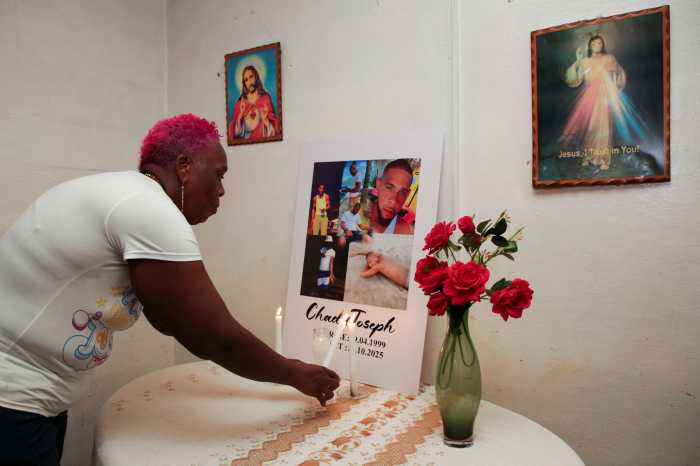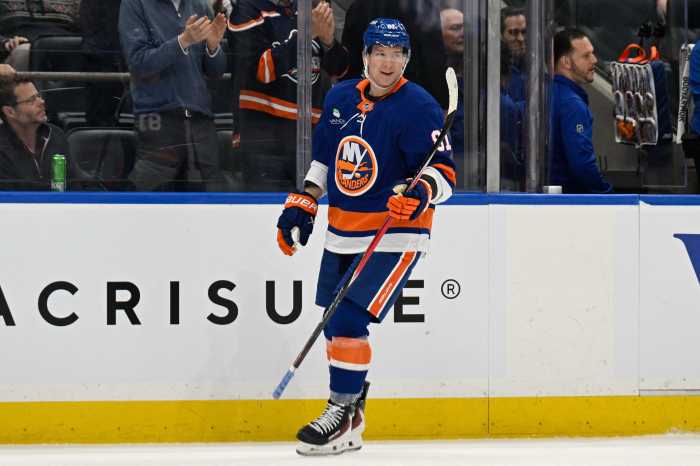Tuc Watkins is Hank, the divorcing married father who is the live-in lover of Larry, played by Andrew Rannells. | ROBERT TRACHTENBERG
Simpering, self-loathing gay stereotypes. That’s why many naysayers are refusing to see the revival of “The Boys in the Band,” now on Broadway for the first time. And that’s a shame — shouldn’t the play be seen as a cautionary period piece, showing how strained life for gay men once was and how far we’ve come?
When Mart Crowley’s game-changing comic drama, about a tight-knit group of catty “queers” at a birthday party that goes sour, first opened in a fringy New York venue in 1968, gay men were thrilled to finally see themselves portrayed onstage, even if not in the most flattering light. Lines formed around the block, and the play quickly transferred to Theater Four Off-Broadway, where it ran for more than 1,000 performances.
A popular film version that retained the entire cast soon followed, helmed by none other than William Friedkin, who went on to direct “The Exorcist.”
Caustic gay classic still resonates and rankles a half century later
At the time, homosexuality was still branded a mental illness and a same-sex couple holding hands in public could be thrown in jail. It’s hard to imagine how revolutionary this play truly was.
Director Joe Mantello has pulled out all the stops for this production, assembling a top-flight, out-and-proud ensemble led by Jim Parsons (“The Big Bang Theory,” “Harvey”), Zachary Quinto (“Star Trek,” “The Glass Menagerie”), Matt Bomer (“White Collar,” “The Normal Heart”), and Andrew Rannells (“Girls,” “Falsettos”). No less impressive are Charlie Carver, Robin De Jesús, Brian Hutchison, and Michael Benjamin Washington.
Another one of the boys is Tuc Watkins, the television actor best known for his extensive appearances on “One Life to Live” and his turn as the hunky gay neighbor on “Desperate Housewives.” He plays Hank, the conflicted bisexual who leaves his wife and kids to live with his lover, Larry. This marks Tuc’s Broadway debut.
Somehow finding a sliver of time between romping in the park with his young children and rushing to his matinée performance, the insightful, surprisingly candid Watkins spoke with Gay City News about this landmark version of “The Boys in the Band” on its 50th anniversary and why it still resonates, stereotypes and all.
DAVID KENNERLEY: Even 50 years on, “The Boys in the Band” is not without controversy. What do you say to critics who believe the play wallows in negative stereotypes, portraying gays as self-loathing sissies?
TUC WATKINS: When Joe Mantello first approached me to do the reading, I thought, “Why are we opening that door to the attic? I want to be out and proud and move forward.” It wasn’t until rehearsals that it truly came to life for me. I realized that it’s important to examine where we came from. “Mississippi Burning” showed us what racism was like in the 1960s. “Platoon” showed us the horrors of the Vietnam War in the 1960s. So it follows that “The Boys in the Band” would show us the trials of being a gay man in the 1960s. It does not claim to portray a universal experience.
There’s a line in the play where Jim Parsons’ character says, “If we can just learn to not hate ourselves so much.” It was more true when it was written than now, since we’ve made strides socially, psychologically, and politically. I’ve certainly had self-loathing in my time, as a kid and growing into an adult. Joe said it’s not enough to label these characters as self-loathing. Maybe we should look at the society in which they live to see why these characters are self-loathing. It’s a really good point.
DK: A couple of my gay friends said they refused to see the play due to the stale, negative portrayals.
TW: I was one of those guys who said, “I don’t want to see that, let’s move on.”
But it’s important that we do revisit it and talk about it, because the freedoms we have now came at a price. We must remember we are standing on the shoulders of giants, gay men and women who came before us, so we can live as out and proud as we do now.
TOP: ANNA-MARIA LÖFFELBERGER/ BOTTOM: ROBERT TRACHTENBERG
DK: Have there been any modifications to the original or is the dialogue exactly the same?
TW: People often ask if it’s updated and the answer is no. Several cuts have been made and it’s been condensed from two acts to one. We haven’t changed the Bob Dylan reference to the Scissor Sisters.
DK: You play Hank, Larry’s live-in lover, who’s in the process of divorcing his wife and passes as straight. What is it like digging into that character?
TW: Hank is the one with the most courage in that he married a woman he loved. They had two children and he cares about them a great deal. At the same time, he felt that he wasn’t being authentic. When he comes to terms with that, he decides to leave his family to live with a man. I imagine in the 1960s he was disparaged as being a horrible person, but to face that and live authentically, that takes balls. Historically we can look at people who didn’t have such courage and led lives of quiet desperation.
DK: You have two young children. Does that help you relate to Hank?
TW: I am a single gay dad; I had them through surrogacy. When I think of what it would take to leave my kids, I can hardly wrap my head around that. The anguish and turmoil that it creates is extraordinary.
DK: Hank and Larry wrestle with monogamy. Do you think that issue has changed much?
TW: That’s an age-old thing, isn’t it, loving one person but still yearning to mess around with others? Fifty years ago there was rampant promiscuity among gay men and then the AIDS crisis hit, so they coupled up and were more cautious. Now in the age of PrEP, they are back to being promiscuous. It’s a cyclical thing.
There is usually one member of the couple who is more interested in extracurricular sex. How do you navigate that? The play shows that what works for some couples may not work for others. It’s all about communication. I don’t have the answer and neither does the play. I don’t think anyone’s figured it out, honestly.
DK: Now that gay marriage is an option, isn’t there a stronger feeling of commitment these days?
TW: That’s a really good point. Culturally we as gay people were meant to feel less than. We were told our relationships are bad and not worthy of marriage. How can we come together in a more committed way when society is vilifying us and won’t let us be part of the club? It’s so important to galvanize what relationships we do have, and if we can make that kind of commitment publicly among family, friends, and colleagues, it is a blessing and informs everything we do.
DK: The role of Hank is a far cry from your “Desperate Housewives” character, Bob Hunter, a successful gay lawyer with a husband.
TW: They are similar in that they both know themselves really well and are good at what they do professionally. They are both very steady and you can trust these guys. The difference is that Hank is tortured and Bob is comfortable in his own skin. That’s because he came a couple of generations after Hank. Hank’s tortured journey to become a more authentic person helped pave the way for guys like Bob. We are not self-actualized, however, not on top of that pyramid quite yet.
DK: You famously came out during an interview with Marie Osmond after the “Desperate Housewives” run. What made you decide the time was right?
TW: To be perfectly honest, I never wanted to come out because I thought it would affect my career. I would say things like, “I want to be a cypher and disappear in my roles, because the more you know about me the less you will believe in my characters.” That’s true, but also I was using it to hide, a theme in the play. There came a time, about five years ago, when I didn’t want to hide any more, to deceive and deflect. I was more interested in telling the truth, and whatever was on the other side of that truth it was going to be okay. Something else became more important than my career, and that was my kids.
DK: The entire cast is openly gay. Do you think that’s making a statement of some kind?
TW: Absolutely. I love that they cast nine gay men — that would have never happened in 1968, or 1998, or even 2008. We all genuinely get along and respect and admire each other. It feels more like a team. When we walk out for the curtain call holding hands, I envision we are all wearing capes, a sort of Gay Justice League. Each one of us has a different superpower that we bring to the Hall of Justice.
DK: What’s it like working with such a talented cast? Is there any competition?
TW: It’s such an honor to work with these guys. I don’t feel there’s competition. Usually when you get a group of people together, especially nine gay guys, certain personalities can jump out. But when you cast somebody like Jim Parsons as the lead, he is such a funny, supportive, benevolent ruler, everybody falls in line and shows up in a benevolent way themselves. It’s a great environment. We uncovered a lot of things we wouldn’t have if we weren’t so comfortable with one another.
DK: The play premiered Off-Broadway just two years after you were born. As the oldest member of the cast, do you have any wisdom to impart to the younger guys?
TW: Although I’m almost twice as old as Charlie, the youngest in the cast, I also have twice as many fears about being gay. There’s little wisdom I can impart, except for my own experience. In fact, they impart wisdom to me, not being so fearful. It’s a two-way street. I watch younger gay guys live more freely, more openly without reservation, and I really admire that.
DK: A few years back you had a Facebook skirmish about gay stereotypes with Jesse Tyler Ferguson, comparing his portrayal on “Modern Family” to “blackface.” I was very impressed with your response to his objection.
TW: What I said back then was that I had a hard time watching what I thought to be a gay stereotype that scared me. The truth is, I was really wrong about that. It was my problem, not Jesse’s or “Modern Family’”s problem. There are all kinds of gay people on the spectrum and I felt I had kept seeing the same gay identity in entertainment. I thought the front lines needed to be more populated with different colors of the tapestry that we are. I shouldn’t have attacked somebody else for it. What I was doing was attacking my own demons. I want to be better than that. During much of my youth and adulthood I didn’t feel okay being myself. It’s experiences like [the one with Jesse] that hold a mirror to ourselves and we try to learn from it.
DK: What do you hope today’s audiences take away from this play?
TW: In the heteronormative society we have a lot of support and sympathy for the gay experience. What Mart Crowley did a half-century ago was drill a hole in the wall and let the world peek into what it’s like to be a gay man. When you see a play like this as a supporter or ally, you start to comprehend why we’ve had a hard time being open. As the saying goes, if you understand the monster and develop empathy it’s not a monster anymore.
This interview has been condensed and edited for clarity.
THE BOYS IN THE BAND | Booth Theatre, 222 W. 45th St. | Through Aug. 11: Mon., Thu.-Sat. at 8 p.m.; Tue.-Wed. at 7 p.m.; Sat.-Sun. at 2 p.m. : $60-$199; boysintheband.com | One hr., 50 mins., no intermission
The cast of “Boys in the Band”: (front, left to right) Michael Benjamin Washington, Robin De Jesús, and Brian Hutchison; (center) Zachary Quinto, Matt Bomer, and Charlie Carver; (rear) Tuc Watkins, Andrew Rannells, and Jim Parsons. | ROBERT TRACHTENBERG

